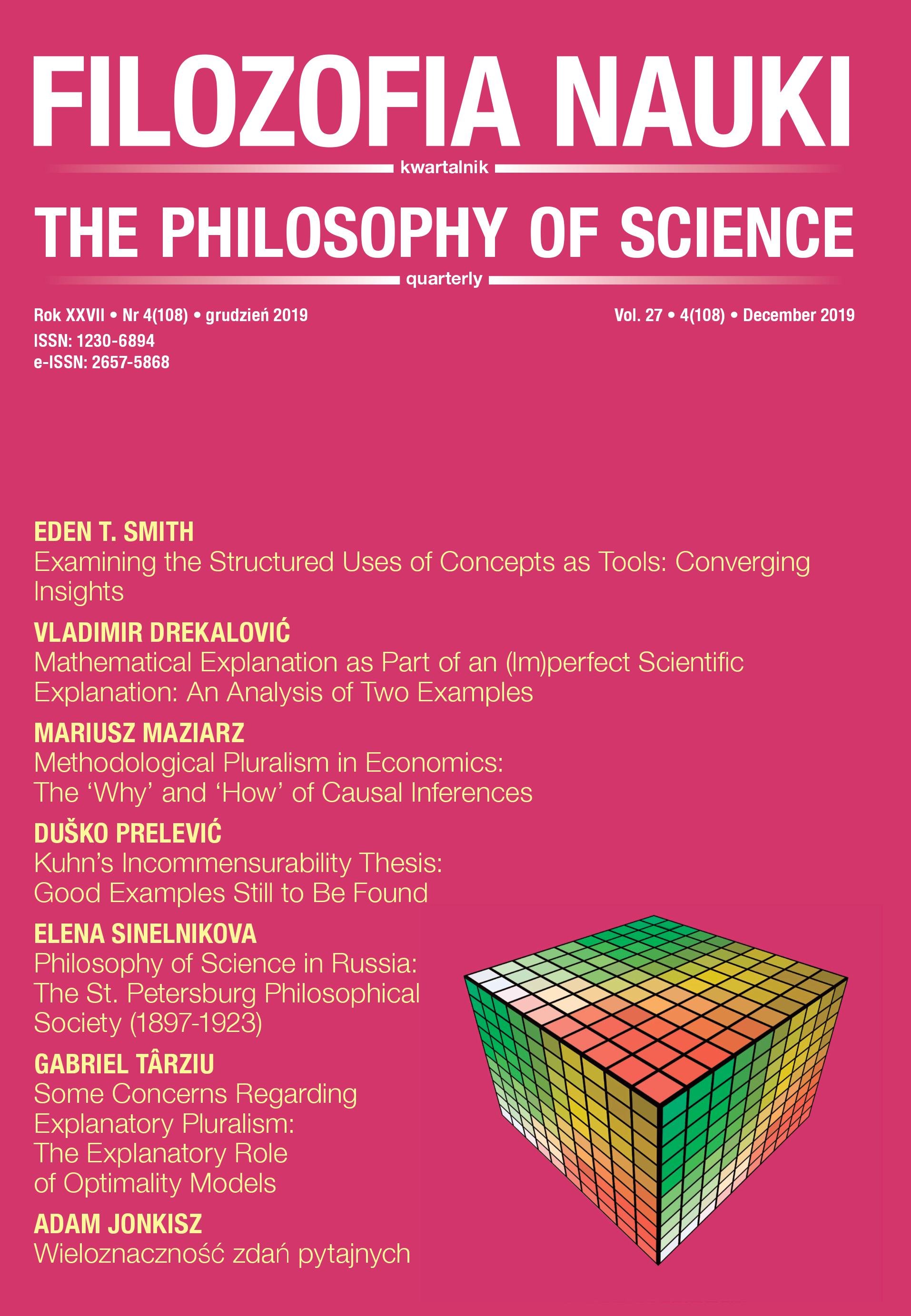Mathematical Explanation as Part of an (Im)perfect Scientific Explanation: An Analysis of Two Examples
DOI:
https://doi.org/10.14394/filnau.2019.0024Słowa kluczowe:
filozofia matematyki, wzmocniony argument z niezbędności, wyjaśnianie matematyczne, problem królewieckich mostów, przypadek cykadAbstrakt
Alan Baker argues that mathematical objects play an indispensable explanatory role in science. There are several examples cited in the literature as solid candidates for such a role. We discuss two such examples and show that they are very different in their strength and (im)perfection, although both are recognized by the scientific community as examples of the best scientific explanations of particular phenomena. More specifically, it will be shown that the explanation of the cicada case has serious shortcomings compared with the explanation of the case of Königsberg’s bridges. We will argue that the latter is a perfectly reliable scientific explanation that employs mathematical reasoning whereas the former is not.
Bibliografia
Baker A. (2009), “Mathematical Explanation in Science,” British Journal for the Philosophy of Science 60(3), 611-633. https://doi.org/10.1093/bjps/axp025
Baker A. (2016), “Parsimony and Inference to the Best Mathematical Explanation,” Synthese 193(2), 333-350. https://doi.org/10.1007/s11229-015-0723-3
Bangu S. (2008), “Inference to the Best Explanation and Mathematical Realism,” Synthese 160(1), 13-20. https://doi.org/10.1007/s11229-006-9070-8
Barrantes M. (2019), “Optimal Representations and the Enhanced Indispensability Argument,” Synthese 196(1), 247-263. https://doi.org/10.1007/s11229-017-1470-4
Behncke H. (2000), “Periodical Cicadas,” Journal of Mathematical Biology 40(5), 413-431. https://doi.org/10.1007/s002850000024
Bianchi S. (2016), “Which Explanatory Role for Mathematics in Scientific Models? Reply to ‘The Explanatory Dispensability of Idealizations’,” Synthese 193(2), 387-401. https://doi.org/10.1007/s11229-015-0795-0
Colyvan M. (2018), “The Ins and Outs of Mathematical Explanation,” The Mathematical Intelligencer 40(4), 26-29. https://doi.org/10.1007/s00283-018-9799-1
Diestel R. (2005), Graph Theory, New York: Springer.
Dieveney P. (2018), “Scientific Explanation, Unifying Mathematics, and Indispensability Arguments (A New Cicada MES),” Synthese, DOI: 10.1007/s11229-018-01979-9.
Drekalović V. (2016), “Two Weak Points of the Enhanced Indispensability Argument — Domain of the Argument and Definition of Indispensability,” Organon F 23(3), 280-298.
Drekalović V., Žarnić B. (2018), “Which Mathematical Objects are Referred to by the Enhanced Indispensability Argument?,” Journal for General Philosophy of Science 49(1), 121-126. https://doi.org/10.1007/s10838-017-9381-0
Drekalović V. (2018), “Is the Enhanced Indispensability Argument a Useful Tool in the Hands of Platonists?,” Philosophia 47(4), 1111-1126. https://doi.org/10.1007/s11406-018-0033-3
Düntsch I., Gediga G. (2000), Sets, Relations, Functions, Bangor: Methoδos Publishers.
Goles E., Schulz O., Markus M. (2001), “Prime Number Selection of Cycles in a Predator–Prey Model,” Complexity 6(4), 33-38. https://doi.org/10.1002/cplx.1040
Hales T. C. (2001), “The Honeycomb Conjecture,” Discrete and Computational Geometry, 25(1), 1-22.
Lange M. (2013), “What Makes a Scientific Explanation Distinctively Mathematical?,” British Journal for the Philosophy of Science 64(3), 485-511. https://doi.org/10.1093/bjps/axs012
Liggins D. (2008), “Quine, Putnam, and the ‘Quine–Putnam’ Indispensability Argument,” Erkenntnis 68(1), 113-127. https://doi.org/10.1007/s10670-007-9081-y
Lloyd M., Dybas H. (1966), “The Periodical Cicada Problem I. Population Ecology,” Evolution 20(2), 133-149. https://doi.org/10.1111/j.1558-5646.1966.tb03350.x
Maddy P. (1990), Realism in Mathematics, New York: Oxford University Press. https://doi.org/10.1093/019824035X.001.0001
Panza M., Sereni A. (2013), Plato’s Problem: An Introduction to Mathematical Platonism, New York: Palgrave Macmillan. https://doi.org/10.1057/9781137298133
Pincock C. (2012), Mathematics and Scientific Representation, Oxford: Oxford University Press. https://doi.org/10.1093/acprof:oso/9780199757107.001.0001
Smullyan R. (1992), Gödel’s Incompleteness Theorems, Oxford: Oxford University Press.
Tallant J. (2013), “Optimus Prime: Paraphrasing Prime Number Talk,” Synthese 190(12), 2065-2083. https://doi.org/10.1007/s11229-011-9959-8
Varro M. T. (1934), On Agriculture, trans. by W. D. Hooper, Harrison Boyd Ash, Cambridge, MA: Harvard University Press (Loeb Classical Library).



















 Filozofia Nauki | ISSN 1230-6894 | e-ISSN 2657-5868
Filozofia Nauki | ISSN 1230-6894 | e-ISSN 2657-5868